Erica Vetsch's Blog, page 70
January 20, 2021
Famous First Words: The Power of a Strong Opening Sentence
It was the best of times, it was the worst of times, it was the age of wisdom, it was the age of foolishness, it was the epoch of belief, it was the epoch of incredulity, it was the season of Light, it was the season of Darkness, it was the spring of hope, it was the winter of despair.
A Tale of Two Cities, Charles Dickens, 1859
It was a bright cold day in April, and the clocks were striking thirteen.
1984, George Orwell, 1949
Call me Ishmael.
Moby-Dick, Herman Melville, 1851
There was a boy called Eustace Clarence Scrubb, and he almost deserved it.
The Voyage of the Dawn Treader, C. S. Lewis, 1952
There’s something about a power-packed opening line that entrances a reader. It can set the mood, reveal treasured insights into the main character, raise intrigue, provide humor, surprise, and invite your readers into your story.
When I was finishing my latest release, All Through the Night, I glanced back through the first chapter, sensing that something was off. The pacing was fine, the setting was good, and I loved the mood, but I couldn’t quite put my finger on what was wrong. With a sigh, I shoved away from my computer, determined to take a break. Turning to my bookcase, I grabbed the newest story I was dying to read: Becoming Mrs. Lewis by Patti Callahan.
I flipped to the first page.
From the beginning it was the Great Lion who brought us together.
That’s a great line.
I pursed my lips and reached for my worn copy of Pride and Prejudice.
It is a truth universally acknowledged, that a single man in possession of a good fortune, must be in want of a wife.
Excited, I began yanking volume after volume off my shelves to examine each book’s opening lines. All the Light We Cannot See, Redeeming Love, Anne’s House of Dreams . . . my office was soon filled with open volumes. I turned back to my computer and stared at the first page of my story.
That’s what was missing. An intriguing opening sentence.
All Through the Night originally opened up like this:
Eh. It’s okay, but it tells the reader nothing about Cadence. It does nothing to introduce the tone of the book. To make the reader curious. I then tweaked it to this:Cadence Piper walked down the darkened street, breath ragged.
Better, but not there yet. I needed my readers to feel Cadence’s fear. To know she was in a dangerous place. After trying several different lines, All Through the Night’s opening paragraph is this:Cadence Piper walked down the darkened street, her booted footsteps clicking loudly against the gritty walk.
Much better.
“Yea, though I walk through the valley of the shadow of death, I will fear no evil: for thou art with me.” I will fear no evil. I will fear no evil . . .
Cadence Piper walked down the darkened street, clutching her reticule to her middle.
The lovely thing about power-packing the opening sentence of your story, and I would say each chapter, is that there’s a variety of sentences to choose from. Each of them can be used to reveal a unique aspect of story depth to your reader.
1. Action Sentence
An action sentence shows movement, something happening, but the action should point to something intrinsically important to the character’s situation or hint at the conflict that is coming.
When the phone rang, Parker was in the garage, killing a man.
Firebreak, Richard Stark
2. Character Sentence
The character sentence establishes a character in our mind, but also tells us something about him or her. It makes us curious. It should be written in such a way to make us lean in and subconsciously say, “Tell me more.”
When the blind man arrived in the city, he claimed that he had traveled across a desert of living sand.
The Brief History of the Dead, Kevin Brockmeier
3. Dialogue Sentence
Dialogue is one of my favorite ways to open a story. It immediately pulls the reader into the thick of the action. Be careful to quickly establish who is speaking and give the reader some sense of time and place if you open with dialogue. They will want to feel grounded to something to continue reading.
He speaks in your voice, American, and there’s a shine in his eyes that’s halfway hopeful.
Underworld, Don DeLillo
4. Thought Sentence
The thought sentence can be a bit trickier to pull off but is highly effective if it fits your opening scene. The higher the stakes, the more desperate or quirky or shocking the thought.
Don’t fail. Tonight of all nights, don’t fail.
Engraved on the Heart, Tara Johnson
5. Statement Sentence
This is the most wonderfully broad and yet creatively diverse of all the opening sentences. A statement can be curious, self-deprecating, thoughtful, philosophical, matter-of-fact, humorous, or mysterious, as long as it fits the tone of your book, invokes curiosity, and reveals something about your character or setting.
I’ll make my report as if I told a story, for I was taught as a child on my homeworld that Truth is a matter of the imagination.
The Left Hand of Darkness, Ursula Le Guin
All children, except one, grow up.
Peter Pan, J. M. Barrie
Once upon a time, there was a woman who discovered she had turned into the wrong person.
Back When We Were Grownups, Anne Tyler
6. World-Building Sentence.
This is an opening line that transports the reader into a new place. It can be a galaxy far, far away or the peaceful shores of Prince Edward Island. It sets the reader on new soil, with fresh sounds, smells, and wonders as it tiptoes them into the story.
Far out into the uncharted backwaters of the unfashionable end of the Western Spiral arm of the Galaxy, lies a small unregarded yellow sun.
The Hitchhikers Guide to the Galaxy, Douglas Adams
A fun exercise is to take the current opening line of your work in progress and rewrite it in all six of these sentence types. You may be surprised how much it changes . . . and how your own creativity is charged as a result.
When in doubt, don’t be afraid to start with a classic.
“Once upon a time . . .”
About the Author

Tara Johnson is a passionate lover of stories who uses fiction, nonfiction, song, and laughter to share her testimony of how God led her into freedom after spending years living shackled to the expectations of others. Tara is the author of three novels set during the Civil War: Engraved on the Heart, Where Dandelions Bloom, and All Through the Night, which releases in January 2021. She is a member of American Christian Fiction Writers and makes her home in Arkansas with her husband and three children. Visit her online at tarajohnsonstories.com.
About All Through the Night
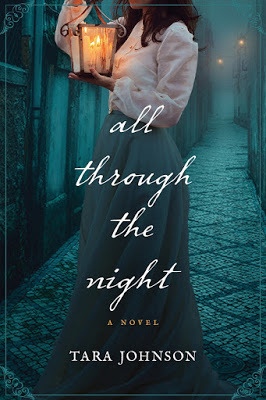
With her stammering tongue and quiet ways, Cadence Piper has always struggled to be accepted. After the death of her mother, Cadence sets her heart on becoming a nurse, both to erase the stain her brother has left on the family’s honor and to find long-sought approval in the eyes of her father. When Dorothea Dix turns her away due to her young age and pretty face, Cadence finds another way to serve . . . singing to the soldiers in Judiciary Square Hospital. Only one stubborn doctor stands in her way.
Joshua Ivy is an intense man with a compassionate heart for the hurting and downtrodden. The one thing he can’t have is an idealistic woman destroying the plans he’s so carefully laid. When the chaos of war thrusts Cadence into the middle of his clandestine activities, he must decide if the lives at stake, and his own heart, are worth the risk of letting Cadence inside.
Everything changes when Joshua and Cadence unearth the workings of a secret society so vile, the course of their lives, and the war, could be altered forever. If they fight an enemy they cannot see, will the One who sees all show them the way in the darkest night?
GiveawayLeave a comment for Tara for a chance to win a copy of All Through the Night.
(Prize courtesy of Tyndale House Publishers. It is subject to Seekerville's Giveaway Terms & Conditions. US residents only.)
January 19, 2021
Writing Reflections in the New Year
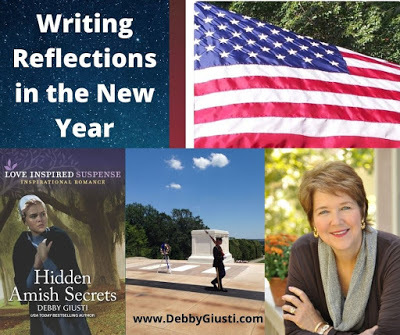 By Debby Giusti
By Debby GiustiToday, I'm sharing my reflections on the writing life along with a few patriotic memes.
Each of us started our writing journey for a reason. Some of us wanted to see our names in print. Others may have yearned for fame and fortune. But most of us probably put pen to paper because we had a tale to tell. That initial “story of our heart” propelled us forward and gave us the wherewithal to not only begin writing but to keep working until we typed “The End.” The process of taking an idea and developing it into full-length fiction exhilarated us, and before long we were creating the next story and the one following.
We worked long hours, often in less that comfortable conditions. Our stories were sometimes maligned or misunderstood, and we learned the hard truth that rejection was part of the writing process. Yet we forged on, honing our craft in hopes of creating the best possible story so we could attract an editor and land a contract.
No matter the reason we began to write, we soon discovered new reasons to continue writing.

Most of us sit alone at our computers, usually in small work spaces in our homes. In the past, conferences and writing events provided opportunities to meet other writers face-to-face. Now we interact on FaceTime, Zoom or other video conferencing sites.
It doesn’t take long for anyone who attended RWA National or ACFW in the past to realize that writers are creative and motivated. We’re life-long learners who strive for excellence. We’re also a warm and welcoming group that forms friendships quickly.
We’ve seen that in Seekerville. What started as a handful of women on the road to publication has turned into a blog community, a family of writers and readers, who share a common love for the written word.

Writers on this blog—and indeed the majority of writers I know—support and encourage one another. We find opportunities to share what we’ve learned in hopes of smoothing the path for those who come after us. We post blogs or teach workshops to pass on tips and techniques. A few of us lead writing classes, others publish how-to books or host mentoring groups and brainstorming sessions. All of us are focused on the same destination, yet the journey never ends because there’s always something new to learn.
Some folks write for their own personal satisfaction, but most of us create stories for our readers…for the high school graduate applying for his or her first job, for the single mom struggling to pay the rent or the guy who works two jobs to send his kids to college or the mother of five who finds a few minutes to read at the end of her busy day. Whether reader or writer, we speak the common language of story that breaks down barriers and makes us kindred spirits, sharing the same love for the written word. Connecting through email or letters or personal contact makes us work all the harder to create stories that uplift and inspire and touch our readers’ hearts.

Looking back on my writing journey, it’s not the books I’ve written that bring me joy; rather, it’s the people I’ve met because of those books.
As always, I thank God for the writer and reader friendships that I wouldn’t have if I hadn’t started on the road to publication years ago.

I also thank God for Seekerville, a cyber home that stretches around the world. Each of you are at the top of my list of blessings. Thank you for bringing joy to my life and for giving me a reason to write.
The past year has been topsy-turvy to say the least and the future is filled with question, especially with the recent attacks on free speech. In the days ahead, I hope we’ll continue to publish our stories and be able to maintain our connections online. No matter what happens, God is in charge and His Will shall prevail.
Today, as our government changes leadership, I offer the following prayer that has been meaningful to me.
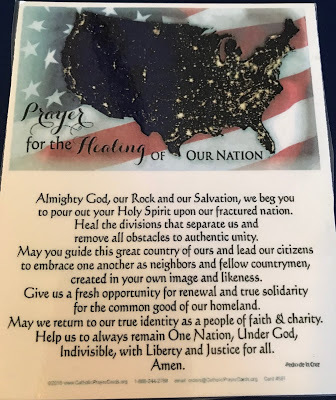 Written by Pedro de la Cruz
Written by Pedro de la CruzGod bless you, dear friends, and God bless America.
Share the blessings you’ve discovered on your own writing journey. What motivates you to keep moving forward as you work toward publication and beyond?
Wishing you abundant blessings,
Debby Giusti
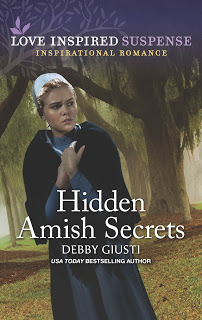
HIDDEN AMISH SECRETS
Her temporary Amish homecoming
could get her killed.
Julianne Graber left her Amish life behind after a family tragedy, but now she’s back to sell the family home— and someone’s dead set on getting rid of her. With her neighbor William Lavy by her side, Julianne must uncover dangerous secrets to make sense of the past and present. Can she find justice for her family—and a future with Will—before the killer hits his target?
Pre-Order on Amazon!
January 17, 2021
Facing Turmoil? Write!
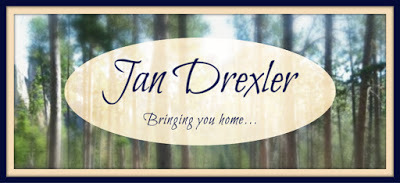
I don’t have to tell you that we are in the midst of a tumultuous time. The last eleven months have been anywhere from disruptive to horrendous, depending on where you live.
But depending on how old you are, this isn’t your first go-round with pandemics and political turmoil.
Today, January 18, 2021, is Martin Luther King Day.
His rise to public prominence, his famous “I Have a Dream Speech,” and his shocking assassination all took place during the 1960’s – a time of political turmoil.
Just think of the nation-shattering events that took place during that decade –
Wait, let’s narrow this down to one year: 1968.
On January 23, North Korea seized the USS Pueblo, initiating an eleven-month standoff between the US and North Korea
On January 30, the Tet Offensive was launched (part of the Vietnam War) and continued into September.
On April 4, Martin Luther King Jr. was assassinated in Memphis, sparking riots in more than one hundred cities across the country.
In April, student protests at Columbia University in New York sparked similar campus protests across the country.
On June 4, Robert Kennedy (John F. Kennedy’s brother) was shot in Los Angeles while campaigning for president.
On August 28, anti-war protests outside the Democratic National Convention in Chicago turned violent, now known as the Chicago Riots.
It was a year filled with violence, division, and hatred. It was the capstone of the 60’s – a decade that changed America.
What other events shaped that decade? Sputnik, the Cuban Missile crisis, the construction of the Berlin Wall, the US involvement in the Vietnam War exploded, Woodstock happened in the midst of the 1969 “Hong Kong Flu” pandemic, Malcolm X was assassinated in 1965 sparking riots in Los Angeles that left more than thirty people dead, and John F. Kennedy was assassinated in 1963.
Is this beginning to sound familiar?
We aren’t the first generation of writers to be telling our stories in the midst of great upheaval and change – or even a pandemic.
Here is a smattering of the books that were published during the tumultuous 1960’s (there were hundreds):
To Kill a Mockingbird by Harper Lee
One Day in the Life of Ivan Denisovich by Alexander Solzhenitsyn
The Godfather by Mario Puzo
The Spy Who Came in From the Cold by John Le Carre
I Know Why the Caged Bird Sings by Maya Angelou
Green Eggs and Ham by Dr. Seuss
 Do you see my point?
Do you see my point? Writers write. In spite of what is going on outside their writing cave.
So, have the events of the past eleven months affected your writing life?
Have you spent days staring at your computer, feeling unable to put two words together?
Do you feel like the well of ideas has gone dry?
I’m not surprised if you said yes to every one of these!

Writing is hard (as if I have to tell you that!)
My theory (completely untested and based only on my own observations) is that our bodies and brains can only handle one major project at a time. So, while we’re being distracted by pandemics and politics, our minds are looking at our work-in-progress and saying, “I can’t handle that right now.”
What is a writer to do?
Well, we could ignore the news.
Or we could unplug from everyone or anything.
But neither of those are realistic.

Writers write, remember?
Maybe this is the time to put all that “fight or flight” energy into putting our reaction to the world’s events into our stories.
When historical romance wasn’t working for me back in April, I started writing a cozy mystery. Believe me, thinking and plotting how my bad guy is going to meet his doom (in the form of police handcuffs) is a great outlet for my 2020 emotional roller coaster!
Or when I need a break from my cozy, I go back to my historical romance. There is nothing like escaping to the Old West where the deer and the antelope play. Living in another world for a while is a great way to handle the 2020 stress.
Still don’t feel like you can write? I’m sure authors sixty years ago felt the same way.
But think of this: Where would our culture be without the books I listed above? There would never be an offer we couldn’t refuse, Scout would only exist in Harper Lee’s imagination, and Sam I Am would still be trying to get someone – anyone – to try green eggs and ham.
Where will our culture be if you never wrote the story God has laid on your heart?

The comments are open and waiting for you! Have you had trouble writing during the past year? Or has it been a year of great inspiration and productivity for you?
Where do you see your writing going in 2021?
One commenter will win an audio copy of "The Sound of Distant Thunder," book one in The Amish of Weaver's Creek series!
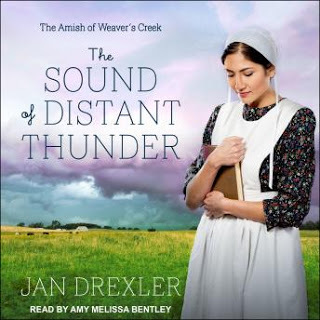
January 16, 2021
Sunday Scripture & Prayer Requests
 Michelangelo Merisi da Caravaggio, 1603, The Calling of Saints Peter and Andrew,
Michelangelo Merisi da Caravaggio, 1603, The Calling of Saints Peter and Andrew,
Hampton Court Palace. [PD-US]
John was standing with two of his disciples,
and as he watched Jesus walk by, he said,
“Behold, the Lamb of God.”
The two disciples heard what he said and followed Jesus.
Jesus turned and saw them following him and said to them,
“What are you looking for?”
They said to him, “Rabbi” — which translated means Teacher —,
“where are you staying?”
He said to them, “Come, and you will see.”
So they went and saw where Jesus was staying,
and they stayed with him that day.
It was about four in the afternoon.
Andrew, the brother of Simon Peter,
was one of the two who heard John and followed Jesus.
He first found his own brother Simon and told him,
“We have found the Messiah” — which is translated Christ —.
Then he brought him to Jesus.
Jesus looked at him and said,
“You are Simon the son of John;
you will be called Cephas” — which is translated Peter.
John 1:35-42
The Seekerville bloggers are praying for YOU and for our entire blog community. If you have any special intentions that need additional prayer coverage, leave a request for prayer in the comment section below.
Please join us in praying for the United States--and the world--during the current rise in Coronavirus cases. Pray for the sick and suffering, for businesses and schools to remain open, for people to be able to work and for our economy to prosper.We are so grateful for all of you—for your friendship and your support!
May the Lord bless you and your families and keep you safe.
January 15, 2021
Weekend Edition


If you are not familiar with our giveaway rules, take a minute to read them here. It keeps us all happy! All winners should send their name, address, and phone number to claim prizes. Please send to Seekerville2@gmail.com. If the winner does not contact us within two weeks, another winner may be selected.
Monday: AK Pittman brought us a post about her new release, Pudge & Prejudice.
Wednesday: Well Ruthy (Ruth Logan Herne) was here on Wednesday chatting about spreadsheets (WHAT????), two-year plans, numbers and production, all in the name of doing what she loves so much: Writing books! And she offered two copies of her newly released novella "Deceiving Death". Lucky winners are Lee-Ann B. and Rachel Herod!
Friday: Winnie Griggs gave us a little mini-lesson on how to understand and handle story stakes. Check back here later to discover who is the winner of a copy of one book from her backlist.

Monday: Jan Drexler will be discussing how 2020 affected us and our writing. Do you need some encouragement? Stop by and comment for a chance to win a audiobook copy of "The Sound of Distant Thunder," the first book in The Amish of Weaver's Creek series!
Wednesday: Debby Giusti will be blogging. Be sure to stop in and join in the discussion. Thursday: Tara Johnson will talk about the Power of a Strong Opening Sentence and her newest novel, All Through the Night. Join us and comment for a chance to win a copy.
Friday: Pam Hillman

Ruthy's whole "North Country" romance series is now available on Amazon! These were Ruthy's debut novels from award-winning manuscripts and she's delighted to have them up for sale again! $1.99 for Kindle and $7.99 for paperback with free shipping for Amazon Prime. Relax and sit back with some great stories as life slowly begins to turn back to normal... because Ruthy loves normal!
CLICK HERE TO BUY!

The first book in Jan's Amish of Weaver's Creek series is available in audio!
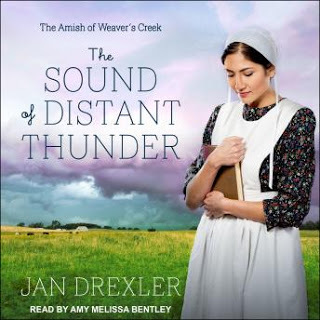
It's available on audiobook platforms including Audible (order here) and Audiobooks.com (order here!)
Hide in Plain Sight by Marta Perry & Amish Rescue by Debby GiustiTwo great stories in Harlequin's New Red Diamond ImprintAvailable Dec 29 on Amazon
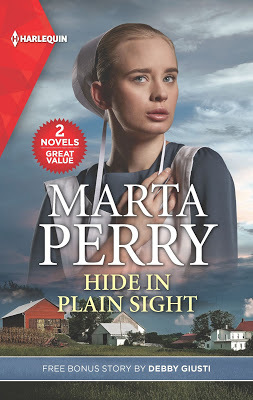

How to Start, Build and Grow Your Email List by Christina Kaye at Helping Writers Become Authors
The Writing Life Compared by Tamela Hancock Murray at Steve Laube Agency
How to Make the Most of Our Story's Tropes by Jami Gold
The Inner Struggle: Guides for Using Inner Conflict that Makes Sense by Janice Hardy at Fiction University
Going From Panster to Plotter by Gerald Brandt at Fiction University
It's In The Details by Cara Putman at Learn How To Write A Novel
How To Price Your Self-Published Book by CS Lakin at The Self Publisher
Five Journaling Prompts for Writers by Hannah Bauman at Between The Lines Editorial
6 Myths Holding You Back in Your Writing Career by Maryann Jordan at Book Brush Blog
A Key Mindset to Achieve More by Michael Hyatt
Three Ideas for Scripture-Based Blogging by Katy Kauffman Blue Ridge Mountains Christian Writers Conference
Let's Talk Stakes

Hello everyone, Winnie Griggs here. Recently I've had discussions with two different writer friends (both relatively new in their careers) on the subject of story stakes - what they are and how to weave them in effectively. So I thought it might be worth it to re-run a post I did here at Seekerville on that very subject way back in 2015.
So here we go.
Stakes are what drive your story forward, what makes your reader really care about the ultimate outcome. Simply defined, the stakes are the consequences your character will face if he fails to achieve his goal. If there is nothing particularly life-changing about those consequences, then your reader won’t have a reason to care.
That being said, stakes don’t have to be large in the general scheme of things, they just have to be large to your protagonist. Because if the consequences for failure doesn’t destroy your protagonist’s world in some way—be it physical, emotional or spiritual—then the reader will begin to think so what, which can be the kiss of death for your story. Having the kind of stakes that your reader can relate to, that allows the reader to internalize the consequences of failure, is what ratchets up the story tension, and story tension is what propels your reader forward through the book. In other words, give your reader something in your protagonist’s world to root for, and then put it at risk.
The stakes are what fuels the tension and conflict in your story. And as you know, the higher the tension, the more of a page-turner your story will be.
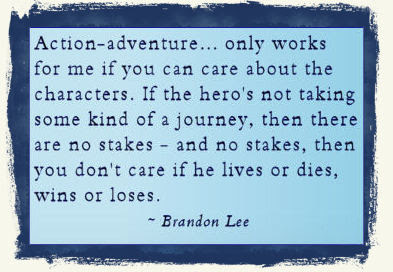
Stakes are what drive your story forward, what makes your reader really care about the ultimate outcome. Simply defined, the stakes are the consequences your character will face if he fails to achieve his goal. If there is nothing particularly life-changing about those consequences, then your reader won’t have a reason to care.
That being said, stakes don’t have to be large in the general scheme of things, they just have to be large to your protagonist. Because if the consequences for failure doesn’t destroy your protagonist’s world in some way—be it physical, emotional or spiritual—then the reader will begin to think so what, which can be the kiss of death for your story. Having the kind of stakes that your reader can relate to, that allows the reader to internalize the consequences of failure, is what ratchets up the story tension, and story tension is what propels your reader forward through the book. In other words, give your reader something in your protagonist’s world to root for, and then put it at risk.
The stakes are what fuels the tension and conflict in your story. And as you know, the higher the tension, the more of a page-turner your story will be.
So here are a few tips for keeping your stakes front and center:
First and foremost, make certain your readers know what the stakes are.
And the sooner the better. The longer you take to introduce the stakes, the greater the risk you run of losing or boring the reader.
Never completely remove the stakes.
If you remove the stakes, you remove the sense of urgency from your story, in fact you rob it of all story tension. If you’re going to remove or resolve a particular story goal or a consequence of failure, make certain you’ve introduced something even bigger to take it’s place.
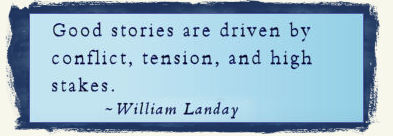
Which brings me to - Keep raising the stakes.
Your stakes should escalate in stages throughout your story. In other words, the consequences for your protagonist if he should fail to achieve his goal should become more significant as the story progresses, and at the same time, his chances of success should narrow.
Turn it into a real nail-biter as you close in on the climax of your story. An added benefit from increasing the stakes is that it forces your character to make riskier and riskier choices. You should always be thinking how can I make this bad situation worse for my protagonist.
Reinforce the stakes occasionally.
Despite what I said above, you won’t be able to raise the stakes in each and every scene. So when you’re not working on raising the stakes, you may want to reinforce them. Subtly remind the reader what the stakes are, or show some other aspect of the consequences that may not have come to light initially.
Make your stakes engaging.
Your stakes need to really matter to the character in a way that engages the reader. But keep in mind, the stakes don’t need to be earth-shattering to do this. Internal stakes can be just as compelling if properly motivated—for instance, failing to get the job your character has set his sights on can be devastating to him, and vicariously to the reader, if he’s sacrificed for years to work his way up the ladder and has tied his entire sense of self-worth, or the future well-being of his family, to achieving that goal.
Test your stakes by asking so what
What would happen if the protagonist just walked away from his goal? Would there indeed be strong consequences and repercussions to that character? If not, then you don’t really have high stakes. This is true even if there are dire consequences to ‘nameless others’ in the story. Because stakes are all about personal loss and the reader connection. What the reader cares about, what they are investing their time and emotions into, is your protagonist.
So what are some ways to raise the stakes in your story?
Be Clear On The Consequences
Make certain your reader understands the stakes. Even if you’re not ready to reveal all the repercussions, there should be a clear impression that the stakes matter.
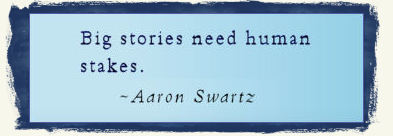
The Stakes Should Be Personal
Having consequences that involve nameless masses is nowhere near as effective as having stakes that impact your protagonist personally. If you’ve done your job right, the protagonist is who your reader will identify with, who they will sympathize, with and you must give them a reason to worry about and root for them.
Use Subplots To Fold In Additional Stakes
Subplots are a good way to introduce conflicts with smaller stakes that will keep things moving in Act Two of your story. And if you want to show your protagonist failing early on, this is a place to do it. But these additional stakes are most effective when they feed into and impact the major story stake in some way.
Escalate
Start with small but intriguing consequences, then allow them to snowball into something that grows bigger as the story progresses. If you pile it all into your opening scenes that leaves you nowhere to go.
Use The Domino Effect
It’s the old cause and effect method. You want a logical escalation. Show how decisions – good or bad – that are made at each step of the way cause problems and escalation of consequences down the road.
Most Importantly, Show What Your Protagonist Must Sacrifice
Part of what’s at stake is that your protagonist will change in some way to reach their goal. And this will likely require a sacrifice on their part. Make certain, before the climax of your story, you have given us a view of how deep this sacrifice will be. You want to give your resolution as much power as you can to make the story satisfying to your reader.

So what do you think? Are stakes something you struggle with in your own writing? Did these pointers help? Can you think of things to add?
Leave a comment to get your name in the drawing for a copy of your choice of any book in my backlist
January 12, 2021
10 Ways to Check Your Two-Year Plan

Hey, Ruthy here, and if you're not familiar with me or my work or my absolutely wonderful books, that's okay... Because you're probably here to see if there's some tidbit of wisdom or advice that's going to give you an edge on getting published.

First: GO YOU! This is a great dream, an awesome career and I am having the time of my life! Jump in. The water's fine!!!!
Second: Probably only about 35% of authors feel that way. To the other 65% (I am totally making that figure up, but I'm basing it on a lot of authors, so I could be right. I could be wrong. Take it with a grain of salt) it's work and a series of ups and downs and failures. But I went into this biz in 2002 and it took 8 years to get published, and honestly, those 8 years honed me and my craft. No regrets!
So yes, failures happen. Book failures, edits, revisions (Can you re-write the whole book please? Because it's awful...) and rejections. And after 61 books (with another four ready to be released in the next nine months) I still get rejected. In fact the most recent one let me know that my book wasn't the category I picked (subjective to publishers: Women's Fiction to one publisher is Mainstream with Romantic Elements to another or Trade-length romance to a third.) after he mentioned being so bored by the opening chapters that he put the book down because he couldn't care less what was happening to the heroine.
HAHAHHAHAHAHAHAHAHAHAHAH!
That would have crushed me eleven years ago. I'd have been curled up in a corner with my blankie and my ni-ni and my binky.

Now I look at it, barely read it, and know that I can put the finished book out as an indie next year and make money-- and good money because I've established myself as a hybrid author with indie and traditional publishing-- because first, he's wrong... it is a good book and the opening will grab a lot of women who've struggled with their pasts. I'm always surprised that even in this day and age an editor can't see beyond his or her preference to what relates to readers. Especially to women who've overcome problems... and second it's okay if the book didn't fit the targeted line but there were nicer ways of saying that. :) I share that because there are power struggles in publishing. Some are seen, some are unseen but they exist and that's part of why you need real backbone to survive and grit to thrive.
But today's point is scheduling. I started making two-year plans long before I was published. Having a simple schedule keeps me focused. And I don't lay out massive charts or plans, I keep it simple.
An excel calendar:

I'm not sure how clear this will be. For this example I color-coded the Love Inspired books and proposals in yellow, the Guideposts Mysteries in blue and my fourth Wishing Bridge in rose.
And here is how I figure out what I can get done even if the world implodes (which seems likely!) sometime soon:
I keep my word count estimate at 1K/day.
That's about 4.5 pages/day.
Here's the reasoning behind that. Could I write faster? Some days, yes. Some days no. But that's a solid 365,000 words/year, or six 60,000 word books.
If I can't make a living off of 5 to 6 books a year....
Or even 4 books/year.
I'm in the wrong business.
So that's my goal. This allows me leeway to adjust as needed. During my busy farm season (I own a pumpkin farm in Western New York) I might have to cut things short. But because I'm usually ahead of schedule, it's no biggie.
So here are the 10 things:
1. Be Realistic. Don't set an unreachable goal unless your goal is to fail.
2. Set a daily word count. It's visible and tangible. Nothing subjective about it.
3. Set up a calendar either online or on a wall or a sheet of paper.
4. List your goals on the calendar even before you're published.
5. Treat your business like a business.
6. Allow wiggle room. If you want to write 2 books/year, 500 words/day will do that.
7. Make writing a habit. Show up, ready to work and then work.
8. If you can quit, do it. Not everyone who loves to read is meant to write and it's a tough business.
9. Print a hard copy every 100 pages +/- and make sure your story makes sense. Do those corrections, then move on to next section. This keeps your book firmly in mind and you can visualize your changes, corrections better.
10. Expect hard times and celebrate the good times. We all fall. The difference is, successful authors get back up. And if you need a helping hand, that's what people like us are for. We don't charge you. We just want to see you be successful.
I love writing stories. I love creating. But I'd be fooling you if I didn't say yeah... it's work. And so much better when you love, love, love your work. (This doesn't mean I love rejections and revisions... but when I entered this arena I vowed to do whatever I needed to do to be successful, so that was my long-range goal... and I've met it. There's a lot of satisfaction in that.)
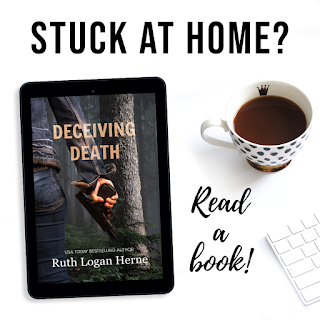
DECEIVING DEATH FOR KINDLE AVAILABLE HERE!!!!!
I'm so happy that you came by today... and I hope visualizing how to look and plan ahead helps because this is about the only thing I plan... is how to reach that four to six book/year goal and stay there.
AND... since all y'all have been so nice, I have an e-copy of "Deceiving Death" to send to two people... but you have to tell me you want it! It's only available on Kindle because it's a novella... but it's a great suspense and I think you'll love it. A quick read... and who doesn't love romantic suspense???

Award winning, USA Today Bestselling author Ruth Logan Herne is living her dream of writing the kind of books she likes to read, having crazy fun with other authors, working on her farm, spoiling her grandchildren and appreciating her many blessings! You can visit Ruthy on Facebook, email her at loganherne@gmail.com, stop by her website ruthloganherne.com or talk with her here in Seekerville. She loves chatting with readers and writers!
January 10, 2021
Austen, Texas, and the Timelessness of Literature By A.K. Pittman
Guest Allison Pittman
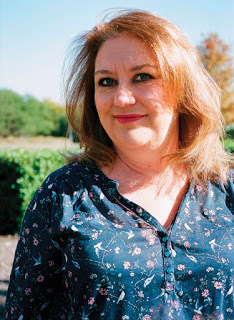
Picture it: Anytown Shopping Mall, 1983. Droves of teenagers roam, in one store and out another, buying mostly nothing, because nobody is really there to shop. No, when a group of girls take a slow, strolling turn past the Foot Locker, the objective is to be seen. Hair teased, jeans pegged and belted, lips glossy, Reeboks clean. Meanwhile, in the food court, boys gather with slices of pizza, sodas, and fries. Watching.
Now, enter a scene from Jane Austen’s Pride and Prejudice. Six people in a room. Firelight, candlelight, crackling conversation. Elizabeth Bennet and Caroline Bingley, arm in arm, take a slow walk around the room. Mr. Darcy watches, knowing exactly what the girls are doing: “. . . you are conscious that your figures appear to the greatest advantage in walking . . . I can admire you much better as I sit by the fire.”
And—just like that—worlds of flirtation, of courtship, of wiles and winks collide.
Full disclosure: I am not an Austen fanatic. Fan, yes, but I’ve never been particularly fixated on her works. What consumes me? The 80’s. When I knew I wanted to write a novel for the YA market, I knew I had to set it in the 80’s. The character Pudge arrived fully formed—a girl who somehow successfully hides her confidence. Then, one day, the title: Pudge and Prejudice, and nothing has ever seemed more perfectly paired.
The beauty of Austen’s work (here, as in others) is the sheer number of storylines to follow. Once could say P&P is a novel of romance, of family, of sisterhood, of friendship, of class war, of womanhood, of second chances—and each statement would be correct. It’s just so malleable. Traces of it live in any novel written since.
But I didn’t want just traces. I wanted to pick it up whole cloth and bring it into my world—at least the world of my obsession: 1980’s, high school, Texas.
Why high school? The stakes for the Bennet sisters in the novel are so high. Marriage. Social standing. Reputation. So, substitute marriage for boyfriend, and you’ve basically got high school. Moving the story to a high school setting allows for a certain playfulness. Gives some breathing space. Nobody’s future is really at stake here. But try telling that to the fifteen-year-old girl pining for a certain boy. There’s an unparalleled passion to first love—requited or not. And don’t get me started on the pain of that first broken heart. Because the cast of Pudge—Elyse and Jayne, Billy and Charlie—see their world’s end at the edges of the school campus and the football field, the reader can feel that with them. Teenagers are, for the most part, blissfully unaware of life beyond high school. So, for my readers who live in that world, it’s a safe, familiar place. And for their parents (who I really hope will read the book, too), it’s a glimpse back into a simpler time, no matter what their graduation year.
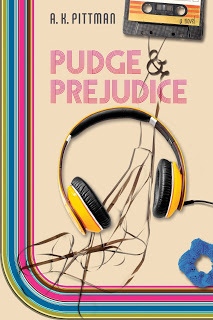
So, why the 80’s? I dunno, maybe it’s because I graduated in 1984, but I feel like the 80’s were the last vestige of innocence. There were still limits, everywhere. We had cable television, but if you wanted to watch a show that aired at 9:00 p.m. on a Thursday, you pretty much had to be sitting in front of your television on Thursday night. And prepare to watch the commercials. If you wanted to see a movie, you had to go to a theater, unless you were lucky enough to own a VCR (or BETA). If you wanted to talk to a friend, you had to talk to them. On the phone, with your parents yelling at you to not tie up the line. Or at the mall. Or walking to and fro. There was no hiding behind tiny words on a screen. To me, this is the biggest tie to Austen’s world. Conversations, letters. Heart-in-the-throat alone in a corner of a room. Finding one another in a crowd. Sneaking away. The Bennet sisters gathered in the front room looking out the window, waiting to hear from Charles Bingley, are no different from any girl—ever—sitting and waiting for the phone to ring. I wanted to bring to story the world of ringing phones and long drives—any excuse to snatch a moment alone. Also, I wanted that last bit of innocence. In Austen’s day, even a whisper of a loss of virtue could ruin a girl’s life. I didn’t want any of my girls to fear ruin, but I did want them to have a bit of worry. We’ve lost the value of virtue. Charlie and Jayne are fully in love, but spare and guarded and shy in their physical expression. I wanted to give young readers a respite from the constant barrage of the hypersexuality so rampant in teen-focused entertainment.
Finally, why Texas? Well, if you’ve ever been in the bleachers on a Friday night with a purple, star-sprinkled sky stretched above you and a thousand people praying for a seventeen-year-old boy to somehow get a leather ball across 23 yards of short-clipped grass . . . what a silly question.
Pudge and Prejudice is an homage to Jane Austen’s Pride and Prejudice, transported to the fictitious Northfield Texas High School in the year 1984. After moving to Northfield with her family, Elyse Nebbit faces the challenge of finding her place in a new school, one dominated by social status and Friday night football. When Elyse’s effortlessly beautiful older sister Jayne starts dating Charlie Bingley, the captain of the school football team, Elyse finds herself curious about Charlie’s popular and brooding best friend, Billy Fitz. Elyse’s body insecurities eventually complicate her relationship with Billy, leaving Jayne and Elyse’s exceedingly blunt friend, Lottie, to step in and help Elyse accept herself for who she is, pant size and all.
A.K. Pittman is an award-winning author of thirteen novels, including the Christy-nominated Sister Wife series and the critically acclaimed The Seamstress. An enthusiast for all things writing, she leads two different writers’ groups, helping to bring new voices to the world of books. When not writing, Allison teaches middle school English, working as a conduit to introduce her students to new, fresh literature. You can follow her around on Instagram (@allisonkpittman) or Twitter (@allisonkpittman) and keep up with her writing news on her Allison Pittman Author Facebook page. Here you’ll learn what’s going on with new books, next books, and day-to-day life with Allison and her husband, Mikey. You’ll also get a peek at Snax, the world’s worst dog.
Links:
January 9, 2021
Sunday Scripture & Prayer Requests
The Baptism of the Lord
 The Baptism of the Christ, Giotto di Bondone, 1303,
The Baptism of the Christ, Giotto di Bondone, 1303,
Scrovegni Chapel, Italy. [PD-US]
This is what John the Baptist proclaimed:
“One mightier than I is coming after me.
I am not worthy to stoop and loosen the thongs of his sandals.
I have baptized you with water;
he will baptize you with the Holy Spirit.”
It happened in those days that Jesus came from Nazareth of Galilee
and was baptized in the Jordan by John.
On coming up out of the water he saw the heavens being torn open
and the Spirit, like a dove, descending upon him.
And a voice came from the heavens,
“You are my beloved Son; with you I am well pleased.”
Mark 1:7-11
The Seekerville bloggers are praying for YOU and for our entire blog community. If you have any special intentions that need additional prayer coverage, leave a request for prayer in the comment section below.
Please join us in praying for the United States--and the world--during the current rise in Coronavirus cases. Pray for the sick and suffering, for businesses and schools to remain open, for people to be able to work and for our economy to prosper.We are so grateful for all of you—for your friendship and your support!
May the Lord bless you and your families and keep you safe.
January 8, 2021
Weekend Edition


If you are not familiar with our giveaway rules, take a minute to read them here. It keeps us all happy! All winners should send their name, address, and phone number to claim prizes. Please send to Seekerville2@gmail.com. If the winner does not contact us within two weeks, another winner may be selected.
Monday: Mary Connealy talked about formatting a book to independently publish it. The winners of her personally(and of dubious quality) formatted book Dr. Tess and the Cowboy--which regardless of the techno-crackups is without doubt a charming, fun, funny read, are: Angeline, Jamie Adams and Lee-Ann B
Wednesday: Mindy Obenhaus was in the house, talking about commitment. The winner of a her upcoming release, A Brother's Promise, is... Sandy Smith! Congratulations, Sandy!
Friday: Carrie Schmidt hosted author assistant Rachel Dixon who shared several helpful tips on how to start, manage, and refresh your street team so it's the most effective it can be! The winner of one January 2021 new release of choice is ...Jenna Night!

Monday: We're glad to welcome author Allison Pittman! She'll be talking about her new release, transports the beloved narrative of Jane Austen's Pride and Prejudice into a Texas high school in the 1980's, highlighting the timelessness of Austen's masterpiece.
Wednesday: Ruthy Logan Herne steamrolls in with a post about planning because darlings, how do you expect to make a career of writing without a plan? Ruthy uses a simple two-year plan that allows room for change because if there is one guarantee in life, it's that change happens! Flexible... but planned. Come see how Ruthy makes adaptable order out of busy life chaos with focus on writing... writing... writing. And there's likely a book giveaway-- or two-- involved! Friday: Winnie Griggs is staying off of social media (mostly) for the time being but she assures us she'll be here on Friday with a post about some aspect of writing. How's that for specifics? :)

Ruthy's .99 new suspense novella is so much fun to read... and it's available for Kindle or grab and read on KU! Sometimes you just want a quick read and Ruthy wrote it for you!
DECEIVING DEATH
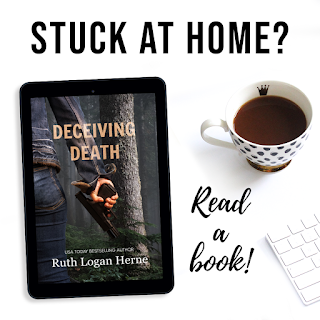

5 Creative Ways to Help You Get Writing by CS Lakin at Live Write Thrive
7 Writing Lessons Learned in 2020 by KM Weiland at Helping Writers Become Authors
Productivity Hacks from Bestselling Writers by Kris Maze
DRM And Protecting E-Books by Matt Knight



